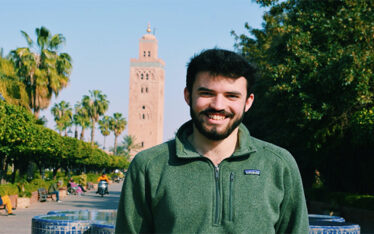
Courtesy of Ale Treviño
Ale Treviño views patriotism in Mexico as an individual choice. For many, but not all, it can be a joy and a celebration. It is quite different and distinct from nationalism.
Where are you from and where do you currently live?
Ale Treviño: I was born and raised surrounded by mountains and amazing people in Monterrey, located in the Northeast of Mexico. For the past year, I had been living in Reims before I decided to go home to spend confinement there and finally return to France for my second year of university.
Define patriotism as opposed to nationalism
Patriotism has a positive connotation for me in the sense that it is devotion to a specific place you feel connected to and the way of life you can experience there. It’s what could be considered to be the best place by a person from that nation given the context in which they lived and how they were raised, but it is not an active effort for it to be the best for everyone else in the world.
It is not an attempt to force your experience onto people or to try to erase theirs but simply of celebrating collectively each other’s loyalties to the nations that raised us and that we consider to be represented by.
Nationalism for me is a more aggressive patriotism in the way that it is self-interested and follows the belief that only your specific nation is the best and has the desire to obtain more power for it. It looks for the spread of that specific nation everywhere and only looks for their interest compared to the rest of the world which could be problematic when it becomes aggressive.
How is patriotism viewed in your country?
I believe the concept of patriotism in Mexico is approached in respecting and commemorating the events in which our nation was founded on as well as by celebrating traditions that have been passed down through generations.
In school, every Monday morning we had to dress in a formal uniform and select students would perform a march to unveil the Mexican flag which we had to salute while simultaneously sing the national anthem in the background. After this, we would have to pledge allegiance to the flag in the following way:
“Mexican flag, legacy of our heroes, symbol of unity between our parents and brothers, we promise you to be always loyal to the principles of freedom and justice that make this an independent, human and generous nation, to which we dedicate our existence.”
This is the school’s role in patriot acts, but September is famously known in Mexico as the patriotic month. This is because the war for independence began between the night of September 15th and the morning of September 16th, 1810. The war is historically known to have started by the Grito of Dolores (cry of Dolores) in which Miguel Hidalgo proclaimed: “Long live our lady of Guadalupe, death to bad government and death to the Spaniards.” Every year since then at midnight on September 15th the cry of Dolores is recreated by our president and broadcasted all over the country, minor scale recreations occur all over the country on this day as well. Now, Miguel Hidalgo’s famous phrase has been modified to say the names of the actors who allowed Mexico to gain its independence.
Going back, when the Spanish arrived in Mexico Hernán Cortés was sadly gifted with an indigenous translator called “La Malinche” who aided them in the conquer of Mexico as a guide and interpreter and people consider a traitor. Today the word Malinchismo, in her honor, is used as a derogatory term to refer to Mexicans that reject their culture and favor foreign ones.
Are you a patriot of your country?
Mexican cuisine is what I would say drives Mexican collective pride the most, it’s what we all celebrate in our everyday life and encourage people from other countries to try. Celebrating Mexican traditions every year like Día de Muertos (Day of the dead) and El Grito (Cry of Dolores) as well as appreciating the art created in my country played an important part in my decision to consider myself a patriot. For me, patriotism is a feeling as natural as that of family, it’s a sense of complete belonging. When I am home, I feel in my most comfortable state as if that is the place I am supposed to be and where I can fully be myself.
How can patriotism be beneficial today?
Patriotism allows the conversation of diversity to exist
The extremist and colonizing patriotism, what I consider nationalism to be sometimes, has a lot of disadvantages in a world as globalized as the one in which we live in today in which people are trying to achieve progress. But, I still consider that the correct form of patriotism is beneficial to society because it allows the conversation of diversity to exist. With a world as big and as different, these types of conversations can be the key to creating an equal and respectful society in which we all learn about different cultures to our own.
How does patriotism impact a country’s flaws?
There’s a legacy of Spanish colonization which we haven’t been fully able to get rid of; for example, the denial of the importance of indigenous Mexican identity. Throughout history, even after our independence from Spain a series of stereotypes have been reinforced in which indigenous people are condemned to separateness as if being Mexican and indigenous were different things.
So, to me, patriotism, in a flawed country, could be considered to be a fake patriotism until every single member is considered a member of the same community and there can be a collective sense of belonging. In Mexico, until we not only see indigenous people as our equals, but we also defeat the social barriers that prevent their full participation and social integration can we be fully patriotic. I believe the collective pride is based more on the country’s people and how they practice traditions.
I deem culture and identity come together to achieve connectedness between the people in a nation. Even though political factors and the global status of a country is important, I do not think this is what achieves collective pride in a community. Political views are usually diverse, even between a close community, so this cannot be the primary association people have between each other but much rather indisputable factors everyone can agree on which is usually traditional and cultural.
Does patriotism have a place in today’s globalized world?
Patriotism should specifically have a place in the present world to be able to achieve an ensemble of celebrated nations who are respected equally. As I mentioned before, patriotism to me has a strictly positive connotation that should have its presence in every country as long as it is approached in a non-violent non-colonizing way in which only one nation’s interest matter but instead as a collective of individual experiences with being patriotic that are all valid and cherished.
Being able to identify myself as a patriot doesn’t make anyone else’s less real. I believe that patriotism could aid in our goals of having a more tolerant and equal society which is why it should be playing an important role in the future.
About the Article
An in-depth look at patriotism vs. nationalism in Mexico today.



